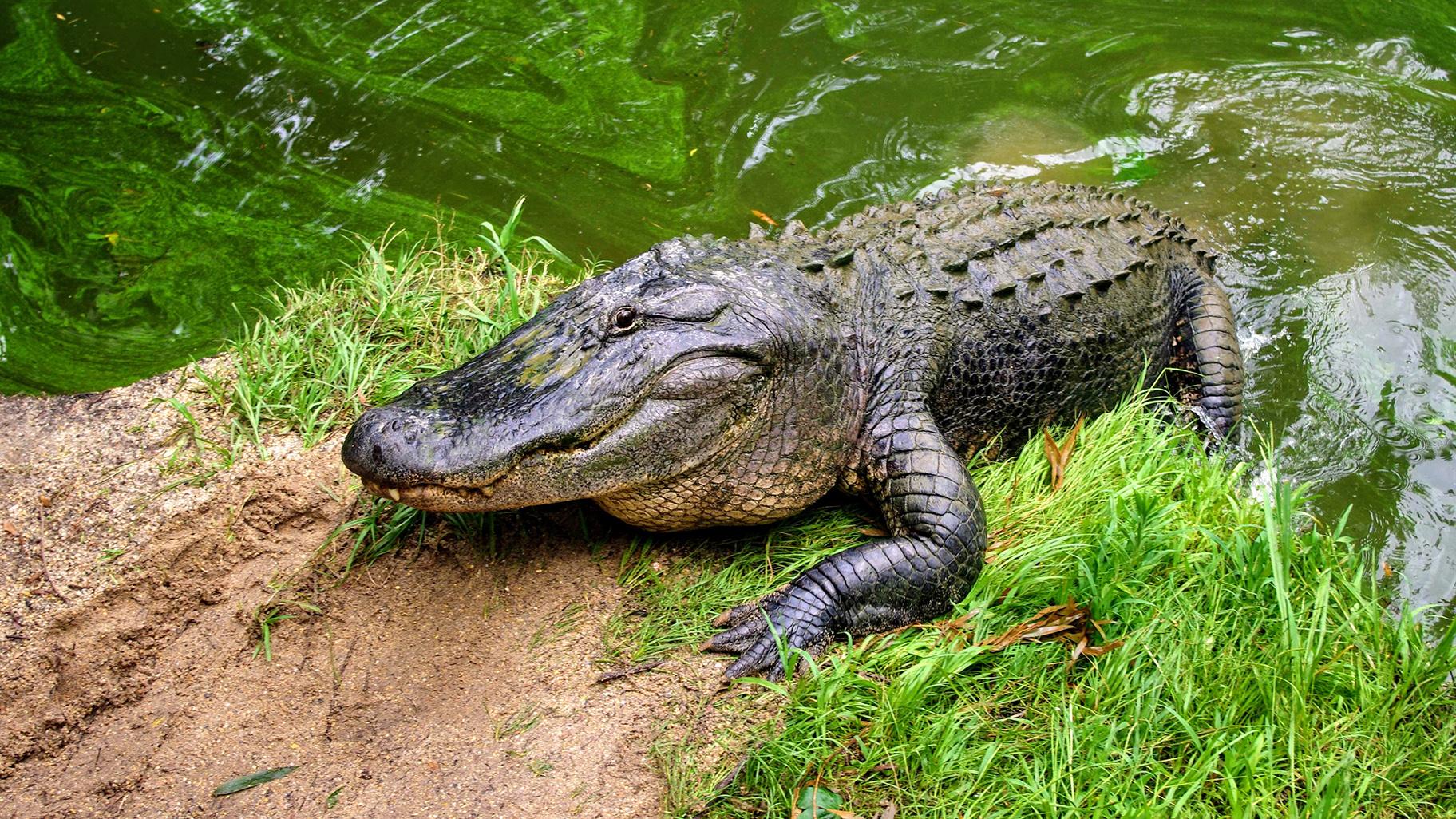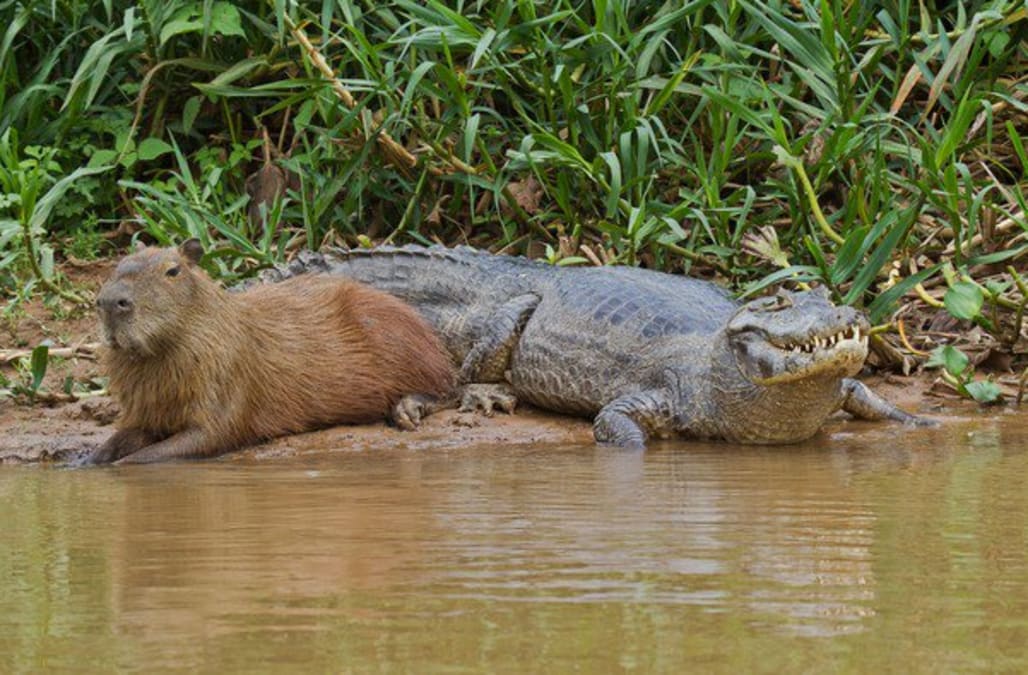We will explore the exciting world of wetlands and rivers, home to alligators, caimans, crocodiles, and capybaras. We’ll discover why these reptiles don’t often eat capybaras. We’ll look at how they have adapted to their surroundings and why capybaras aren’t their favourite food. So, prepare for an exciting trip through marshy areas and wildlife behaviour as we try to answer this question. Why don’t alligators, caimans, or do crocodiles eat capybaras?
What Is A Capybara?
A capybara is the largest rodent in the world, native to South America. It’s often compared to a giant guinea pig due to its similar appearance. They can grow up to 4 feet long and weigh up to 145 pounds. Capybaras have webbed feet, which make them excellent swimmers, and they are semi-aquatic animals who spend a lot of time in water.
Capybaras are social animals that usually live in groups of 10-20 individuals. They are herbivores that eat various plants, fruits, tree bark, and aquatic plants. Despite their size, capybaras are relatively peaceful creatures and have been known to coexist well with many other animal species in their natural habitats.
3 Reasons Why Alligators,Caimans Don’t Always Eat Capybaras Or do crocodiles eat capybaras?
Reason 1: They Have A Different Range From Alligators
Capybaras are a top choice for many predators’ meals. However, they often avoid being eaten by alligators, crocodiles, and caimans. This is mainly because of where they live. Alligators usually live in freshwater places like ponds, marshes, and rivers. They are primarily found in the Southeastern US and Eastern China. This is very different from the South American habitats of most capybaras.

The divide between their territories safeguards these oversized guinea pigs against unwanted attention from alligator families. looming environmental factors like distinct weather patterns also determine why don’t crocodiles eat capybaras often. The lush savannahs where capybaras, like to dwell, possess unique conditions that may not resonate well with certain predator species’ adaptation mechanisms—making space for an unlikely little piece of sanctuary for our amiable rodents.
Reason 2: They’re Hard To Swallow
Undoubtedly, one might imagine the Amazonian Capybara – the world’s largest rodent, as easy prey for predators like alligators, crocodiles and caimans. It’s startling to discover that these fearsome reptiles don’t always feast on Capybaras; they’re hard to swallow! But the question is: do alligators eat capybaras?
Capybaras possess a robust bone structure that makes them difficult to swallow whole. Unlike smaller mammals or fish that these carnivorous reptiles can gulp down in a single bite, devouring an adult capybara requires effortful dissection before consumption. This presents a significant time investment for the predator and increases risk exposure during feeding.

Capybaras have thick, rough fur and loose skin, making it hard for predators like alligators to bite them. They also tend to live in large groups, which helps protect them from potential attacks. This group behaviour often discourages predators from attacking, which could lead to injury or wasted energy. So, while alligators can eat capybaras, it’s rare because it’s not easy or convenient.
Reason 3: They’re Good Company
On the surface, nature’s food chain appears brutally straightforward: large predator consumes smaller herbivores. However, creatures like alligators, crocodiles and caimans often dance on a different beat to this rhythm, especially when interacting with capybaras. So why don’t alligators eat capybaras? One reason is that they make for unexpectedly good company.
There’s a deep respect between capybaras and predators due to living together for millions of years. Capybaras have clever ways to signal danger, which also helps the predators. They act like living alarms, warning everyone nearby about possible threats. This not only helps each other but also their enemies, accidentally creating friendship between natural rivals. This teamwork between different species prevents predators from seeing capybaras as easy snacks.
2 Reasons Why Alligators, Crocodiles, And Caimans Don’t Eat Capybaras In Captivity
Reason 1: They’re Never Hungry
While it may seem like visuals straight out of a National Geographic show, picturing alligators, crocodiles or caimans snapping their jaws onto the world’s largest rodent – the Capybara – you’ll seldom witness this reality in captivity, indeed, do crocodiles eat Capybara? The answer is complex and surprising.
The first sign that these reptilians don’t typically feast on capybaras lies not so much in fear or respect but in satisfaction. Renowned for their cold-blooded metabolism that considerably slows down food digestion rates, it’s not uncommon to see our scale-covered friends lounging rather than hunting after a meal. With measured feeding schedules ensuring they’re never at the brink of extreme hunger, unlike their wild counterparts who feast sporadically, there’s seemingly little reason to make a meal out of their vulnerable neighbours – the capybaras.

Reason 2: They Might Be Lonely
It also astounds you why solitary hunters like alligators, crocodiles and caimans appear sad when confronted with the opportunity to indulge in a meat reward such as a capybara. But consider this far-fetched notion; perhaps they yearn for companionship more than they crave carnage. While these reptilians aren’t traditionally known to seek social interaction like our furry friend–the notorious social butterfly Capybara does–under captivity, circumstances could shift relationship dynamics into curious territories of co-habitation instead of predation.
What Animals Do Eat Capybaras?
Capybaras, the most giant rodents in the world, have several predators. Predominantly, these are creatures native to the same South American habitats as capybaras. Jaguars, pumas, ocelots, eagles, caimans (a type of crocodilian), and anacondas are all known to prey on capybaras.
It should be noted that capybaras are semi-aquatic animals who live near bodies of water, and they can escape from many predators by diving into water. They are excellent swimmers and can stay underwater for up to five minutes. This ability dramatically reduces their risk from some potential threats.
These natural predators, humans also hunt capybaras for their meat and hide in some areas. Despite this pressure from predation and hunting, capybara populations remain stable due to their quick breeding rates.
Final Thoughts
Do crocodiles eat capybaras? Although carnivorous and opportunistic hunters, alligators, caimans, and crocodiles do not typically prey on capybaras. The main reasons are the capybara’s size and agility in water, which often deters these predators. Their habitat distribution also contributes to the relatively low occurrence of such predation events. However, this is not to rule out entirely that such incidents never occur. It’s crucial for further research to be conducted to gain a deeper understanding of these fascinating predator-prey dynamics in the wild.
